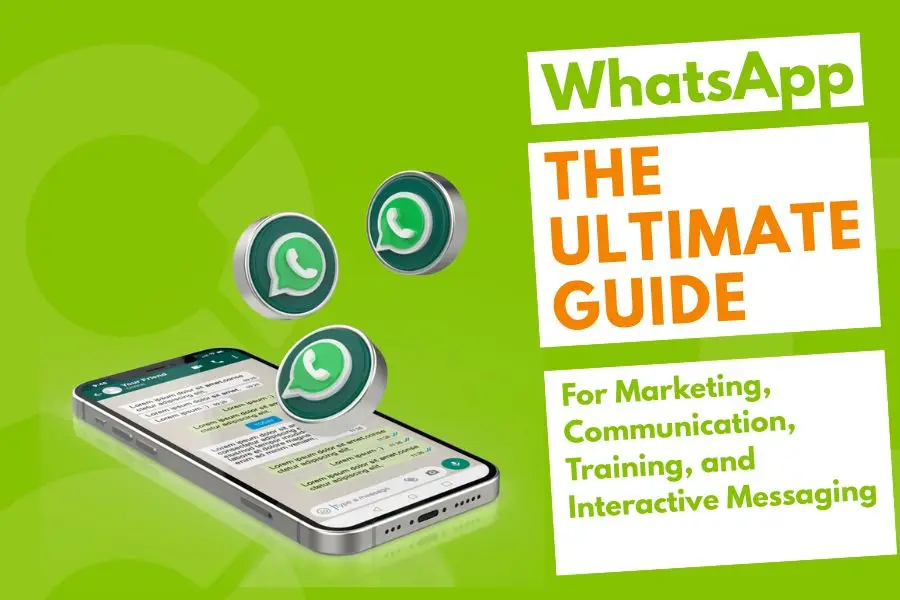WhatsApp API for Business: The Ultimate Guide to Marketing, Communication, Training, and Interactive Messaging

WhatsApp API Business, what’s it all about?
WhatsApp has grown beyond a simple messaging app—it’s now a dynamic tool for businesses, organisations, and training providers. Whether you’re looking to improve customer interactions, streamline internal communications, or deliver engaging training, WhatsApp API and software such as Manychat to design and control it, offers a direct, personal, and efficient way to connect.
This guide explores the many ways businesses and organisations can use WhatsApp API beyond just marketing—covering interactive messaging, customer engagement, training, and streamlined communication.
Why Use WhatsApp API for Business?
WhatsApp API offers businesses and organisations a unique opportunity to communicate with audiences in a way that feels natural and personal. Unlike emails that often go unopened, WhatsApp API messages are read quickly, making it a high-impact channel for engagement. WhatsApp API allows for mass control of lists and significant programming to create intelligent and effective chat sequences.
With over 2 billion active users, businesses can use WhatsApp API to:
- Provide instant customer support
- Share interactive updates and promotions
- Deliver training and educational content
- Create personalised experiences
- Facilitate seamless two-way conversations
From small businesses to large corporations, WhatsApp API provides tools to make communication more efficient, engaging, and effective.
Key Features & Benefits of WhatsApp API for Businesses & Organisations – far more than the more basic WhatsApp Business Accounts
1. Instant, Interactive Messaging
WhatsApp’s real-time messaging capabilities allow businesses to respond to customer queries immediately. Features like quick replies, automated responses, and chat labels help businesses manage conversations efficiently.
Using WhatsApp API powered automated responses ensure that customers receive immediate acknowledgments, even outside business hours, while interactive elements like buttons and lists make it easier for customers to take action without leaving the chat.
2. WhatsApp API for Training & Education
Traditional e-learning platforms and training apps often require users to navigate complex interfaces, remember login credentials, and dedicate time to structured learning sessions. WhatsApp, on the other hand, removes these barriers by delivering training directly to a familiar, easy-to-use platform, making learning more convenient, engaging, and effective.
Our team of experts use the software interface of Manychat to power the right designed and built WhatsApp API solution for your business objectives and can train your marketing and customer care teams to take this technology and gain rapid results.
For training providers, businesses, and educators, WhatsApp provides an interactive, on-the-go learning experience that fits seamlessly into learners’ daily lives. Unlike traditional digital learning apps that often require high engagement upfront, WhatsApp allows learners to consume content in bite-sized formats, at their own pace, without feeling overwhelmed.
Why WhatsApp API powered experiences Outperform Traditional E-Learning Platforms & Apps:







By using WhatsApp for training, businesses and educators can deliver flexible, user-friendly learning experiences that remove friction, increase engagement, and make training more accessible, interactive, and enjoyable than traditional digital learning solutions.
3. Customer Engagement Without the Clutter
WhatsApp is a direct space for communication, meaning businesses can connect with customers without the noise of social media or the overcrowding of email inboxes. By delivering content in a direct and conversational way, businesses can build genuine relationships with customers.
A high response rate and quick interactions mean customers feel heard and valued, leading to stronger brand loyalty.
4. Smarter Messaging with Integrations & Customer Insights
WhatsApp API solutions are not just about chatting—it provides a powerful tool for managing customer interactions, organising data, and sending the right message to the right person at the right time.
With the ability to connect with CRM systems and other business tools, WhatsApp API (many features more than WhatsApp Business) allows businesses to store customer information, track interactions, and personalise messages based on past conversations or preferences.
How Businesses Can Use WhatsApp API for Smarter Communication:




With these features, businesses can move beyond one-size-fits-all messaging and create more personalised, timely, and effective customer interactions.
5. Rich Media for More Engaging Communications
With support for images, videos, GIFs, and voice notes, WhatsApp allows businesses to communicate visually. Whether sharing a behind-the-scenes video, a product demo, or a voice message for a personal touch, multimedia content helps messages stand out.
6. High Open & Engagement Rates
Compared to email, WhatsApp has a significantly higher open rate—messages are typically read within minutes. This makes it a powerful tool for businesses looking to increase customer engagement and response rates.
Best Practices for Using WhatsApp API and its power in Your Organisation
To get the most out of WhatsApp API, businesses should follow these best practices:
1. Know Your Audience
Define who you are communicating with to tailor messages for relevance and impact. Whether it’s customers, trainees, or internal teams, knowing their preferences ensures your messages resonate.
2. Provide Value in Every Message
Make sure every message delivers something useful, relevant, or engaging—whether that’s an exclusive offer, an important update, or practical tips. Avoid sending messages that feel overly promotional or spammy.
3. Personalise Your Communication
Using a customer’s name and tailoring messages to their interests makes interactions feel more natural and human. Businesses using segmentation and automation can send the right messages to the right people at the right time.
4. Use Rich Media for Impact
Text-only messages can be effective, but adding images, videos, and clickable buttons makes your communication more dynamic and engaging.
5. Respect Customer Preferences
WhatsApp is a personal space, so it’s important to get permission before messaging people. Using WhatsApp opt-ins and allowing customers to control their preferences will build trust and avoid being marked as spam.
6. Measure Performance & Improve Strategy
WhatsApp Business API provides access to message analytics, helping businesses track delivery rates, response times, and customer engagement. By monitoring these insights, businesses can refine their messaging strategies for better results.
Getting Started with WhatsApp API Business
1. Choose the Right Version
WhatsApp offers two business solutions:
- WhatsApp Business App – Best for small businesses that need basic messaging features.
- WhatsApp Business API – Ideal for larger businesses, enabling advanced automation, CRM integrations, and bulk messaging.
ADD IN THE DIFFERENCE FOR ABOVE
2. Set Up Your Business Profile
Create a professional business profile including:



3. Enable Automated Messaging & Quick Replies
Set up greeting messages, away messages, and quick replies to streamline responses and keep conversations professional.
4. Build Your Contact List with Opt-ins
Ensure that customers consent to receive messages from you. Use website forms, social media, or in-store QR codes to encourage opt-ins.
5. Start Conversations & Engage Regularly
WhatsApp is not just a broadcast tool—it’s designed for conversations. Businesses that actively interact, respond, and build relationships will see the most success.
Frequently Asked Questions
What is WhatsApp API Business used for?
It’s a business communication tool that allows companies to interact with customers, send updates, provide customer service, and even sell products directly through chat.
Can I use WhatsApp API for training and internal communication?
Yes! Businesses and educators use WhatsApp API for employee training, team coordination, and learner engagement, thanks to its real-time messaging and multimedia capabilities.
Can businesses send promotional messages on WhatsApp?
Yes, but only to customers who have opted in to receive them. Sending unsolicited messages can lead to account restrictions.
How do I track the success of my WhatsApp API campaigns?
Using the WhatsApp Business API, businesses can access analytics like message delivery rates, response times, and engagement metrics to optimise their messaging strategy.
What are the costs of using WhatsApp API for business?
- The WhatsApp Business App is free.
- The WhatsApp Business API involves costs, which vary depending on message volume and integration providers. We advise you get the heads up and low down from expert users of software that powers this. We use the market leading Manychat software and will happily give you a free no obligation presentation on the potential. Just WhatsApp us for details and to arrange this.
Final Thoughts: Why Your Business Should Be Using WhatsApp API
WhatsApp isn’t just a messaging app—it’s a powerful communication tool for businesses, organisations, and training providers. Whether you want to enhance customer engagement, streamline operations, or deliver training, WhatsApp provides a reliable, high-engagement channel to achieve your goals.
By embracing WhatsApp’s features and best practices, businesses can build stronger relationships, improve communication efficiency, and create more meaningful interactions—all in a personal, convenient, and interactive way.
Ready to get started? Explore how WhatsApp APIcan transform your business today. What you waiting for – just WhatsApp our team and we can arrange a FREE presentation and a chat.


